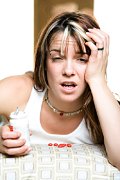
Hangover cures…don’t work. And, that’s official. So you’re stuck with that thumping headache, the sick feeling in your stomach, and the mouth that feels like the bottom of a parrot (or parrot’s cage depending on what you were drinking.
According to a report published in the British Medical Journal some time ago, but timely once again given the imminent holiday season, the only way to reduce the risk of waking up with a stinking hangover the morning after the night before is to not drink alcohol or at the least to avoid imbibing copious amounts of this natural poison.
There is, says the report, “No compelling evidence to suggest that any complementary or conventional intervention is effective for treating or preventing alcohol hangover.”
Apparently, hangovers waste something like £2billlion (almost $4b) in lost earnings every year because of sufferers taking a sickie and forfeiting their pay for the day. Add to that the cost of the various “hangover cures” those drinkers often turn to. They usually do so in the hope that they will be able to get out of bed and stand up straight without feeling sick or as if someone has hit them round the head with a sledgehammer. You get the idea of just how much all this drunken debauchery costs.
The authors of the paper trawled medical databases and the internet looking for hangover cures (it doesn’t say whether they were suffering the after effects of one too many sherberts themselves). They also contacted experts and manufacturers to find any randomised controlled trials of medical interventions that could prevent or treat hangovers.
The results of their search pulled up eight trials testing eight different agents: propranolol (a beta-blocking drug), tropisetron (drug for nausea and vertigo), tolfenamic acid (a painkiller), fructose or glucose, and the dietary supplements borage, artichoke, prickly pear (Opuntia ficus indica), and a yeast-based preparation [not to be confused with a yeast based infection, Ed.]
Of those trials none reported any significant positive effects on post-alcoholic health, although there was some evidence that borage, the yeast-based preparation, and tolfenamic acid had some benefits. “We are confident that our search strategy located all published trials on the subject,” say the authors. “Our findings show no compelling evidence to suggest that any complementary or conventional intervention is effective for treating or preventing the alcohol hangover.”
An earlier paper in the journal suggested that the main active ingredient in beer, wine, spirits and other alcoholic drinks, “ethanol itself may play only a minor part in producing the thirst, headache, fatigue, nausea, sweating, tremor, remorse, and anxiety that hangover sufferers report.” Research shows that hangover symptoms reach their peak, or should that be trough, when almost all the ethanol and its metabolite acetaldehyde have actually been cleared from the blood. Moreover, peak blood ethanol or acetaldehyde levels do not correlate closely with the severity of the subsequent hangover. This is borne out by the fact that between a quarter and half of drinkers claim not to get hangovers even after a drunken binge.
Rather, it’s the congeners – other organic molecules such as polyphenols, methanol, other alcoholic compounds, and histamine – that seem to be to blame more than ethanol itself. Different drinks have different amounts of these nasties. This likely explains why a heavy session on cheap bourbon or brandy – thick with congeners and blinding methanol – is more likely to leave you with a mouth like the bottom of a parrot’s cage and a skull-crushing headache than a half dozen shots of clear, pure vodka. Not that I’d know anything about parrots and skulls, of course.
Consultant anaesthetist Ian Calder of the National Hospital for Neurology and Neurosurgery in London, in a BMJ editorial suggested that “the fear of hangover prompts most people to moderate their ethanol intake.” This may have been true a decade ago. However, given the advent of vodka-based alcoholic shots type drinks in the last few years and the apparent burgeoning of binge drinker numbers across the UK it either no longer holds true or else this kind of research has reached the boozing masses and their drinking habits have evolved to home in on beverages with lower congener concentrations.
It’s all almost enough to make you turn to drink. Or, perhaps turn to a pharmaceutical alternative to alcohol that might emerge from research labs in the near future, according to a report in newscientist.
Alcohol exerts its effects on the brain by latching on to GABA-A receptors in the brain, and these come in various sub-types. Alcohol binds indiscriminately to them all, interfering with many brain pathways including memory and leading to its pleasant and unpleasant initial effects. A designer molecule that binds strongly to the “good” subtypes, producing the pleasurable effects of alcohol without interfering with essential brain processes, could easily be made the magazine reports. But, do we need yet another substance of abuse, especially one with a whiff of a Huxley-type world of Soma addiction?
Still, in the absence of the hangover-free substance, we’ll continue to see throughout the coming party season websites touting cure-alls from jalapeno peppers and the full English breakfast to a good old hair of the dog as the cure to end the morning-after blues.
My personal tip? Alternate your alcoholic drinks with the equivalent volume of good old-fashioned tap water and make sure you boogie more than you booze.
UPDATE: While it is quite easy to discuss a hangover in a relatively light-hearted way, Sciencebase guest author Sheila Gibbs discusses the far more serious side of drink and how alcohol destroys lives